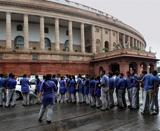
New Delhi, August 22: The row over CAG report on coal block allocation rocked Parliament for the second day today with non-Left opposition demanding resignation of Prime Minister Manmohan Singh amid division in the NDA over the protest tactics.
Key NDA constituent JD-U caused embarrassment to BJP in the Lok Sabha by initiating a special discussion on flood and drought situation even as members of the main opposition were in the Well shouting slogans against the Prime Minister.
Rajiv Ranjan Singh (JD-U) surprised many in the opposition benches by speaking on the issue when Deputy Speaker Kariya Munda took up the listed item.
Unhappy with the disruption caused by BJP, Parliamentary Affairs Minister Pawan Kumar Bansal said the government was willing to initiate the debate immediately on the three CAG reports. But, his offer went unheeded with opposition members shouting slogans like "Pradhan Mantri gaddi choro (PM should quit)."
"Their intention is clear. What do they want to convert Parliament into? Parliament is for discussions. Let them come and discuss. We will demolish the opposition's point of view and that is why they are running away," Bansal said.
With opposition unrelenting, Deputy Speaker Karia Munda adjourned the House for the day shortly after 2 PM.
Earlier also the House could not function and was adjourned twice till 2 PM.
Rajya Sabha was also adjourned for the day around the same time after three adjournments in the pre-lunch sitting on the same issue.






Comments
Add new comment